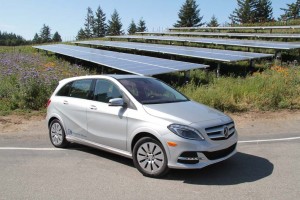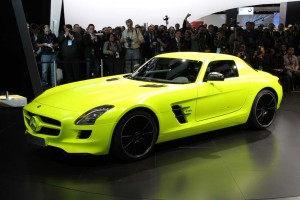The list of manufacturers hoping to tackle Tesla with an extended-range battery car has just grown longer, and Mercedes-Benz apparently has more than one model in mind as it tries to outgun the upstart California carmaker.
Along with an assortment of plug-in hybrids, Mercedes’ R&D chief says it is developing a modular platform that, in at least one model, should deliver up to 500 kilometers, or about 312 miles, per charge. Among other makers looking to push into Tesla territory are Audi, BMW, General Motors and Nissan.
“We are working on an intelligent concept for a highly attractive electric vehicle with a range of (anywhere from 228 to 312 miles),” Research and Development board director Thomas Weber told the magazine Auto Motor und Sport.
Weber did not say what type of vehicle Mercedes is working on, but the modular platform is clearly designed to allow the German maker to use it for more than one model. The first, he suggested, will be coming to market “soon,” which could mean anywhere from the coming model-year to the latter part of the decade.
(Daimler set to launch new version of Smart ForTwo Electric Drive. Click Here for more.)
Though Mercedes might first go after the now-familiar Tesla Model S, the betting seems to favor a utility vehicle of some sort. One reason is the extra space that could provide to tuck away the additional batteries needed to deliver range of as much as 300 miles. Tesla, in fact, is just getting to that bogey with one of its latest Model S variants, the P90d, which will use 90 kilowatt-hours of lithium-ion batteries.
Going with a unique platform provides a manufacturer some advantages when compared to converting an existing vehicle to run on batteries. A key plus is being able to design the platform specially around the unique components that go into an electric vehicle. The Model S, for example, has its batteries neatly tucked beneath the passenger compartment, which doesn’t compromise passenger or cargo space.
BMW is apparently considering the same approach. As TheDetroitBureau.com recently reported, it is developing a new battery-electric utility vehicle for its i sub-brand. But the Bavarian maker may also modify its upcoming BMW X9 utility vehicle for battery power.
(For more on BMW’s push into battery power, Click Here.)
Nissan already has a dedicated EV in the form of its Leaf model. The next-generation electric vehicle will squeeze out more range – by some reports as much as 200 miles a charge – by adding a little more space for its pack and by using next-generation batteries that are more energy-dense.
Packing more energy into a smaller package will allow GM to boost the range of its second-gen Chevrolet Volt plug-in by 40%, while also delivering 200 miles per charge out of a pure-electric model Chevy will launch late next year, the Bolt.
And Audi is also working on several longer-range electric models, as well as a high-performance two-seater based on its R8 sports car.
Luxury makers are particularly interested in battery-electric models because they will need the technology to meet new zero-emissions rules, particularly in California. But they’re also working up an array of plug-in hybrids that, the betting goes, will be an easier sell to a public used to the freedom and flexibility gasoline power provides.
Daimler AG, which spent roughly half of its $6.4 billion R&D budget on low-emissions and alternative powertrain technology last year, has said it will bring 10 PHEVs to market by 2010. BMW isn’t far behind. It will start it with a plug-based version of its X5, followed by the all-new 7-Series and then an array of additional models.
Separately, TheDetroitBureau.com reported, the Bavarian maker’s next M3 model will go plug-in, as well.
(For more on the plug-in BMW M3, Click Here.)



I don’t think the auto makers really care about Tesla, they are trying to get people accustomed to buying impractical, over-priced, meritless EVs because the auto makers have no choice. They need to sell as many EVs and bicycles as they can to offset the fines for not meeting the outrageous 54.5 mpg CAFE decree by Obama and the EPA, which has no basis in science what so ever.
Selling California-qualified zero-emission cars today requires the imagination to take the long view. Downstream, California dealership parts and service profitability may make cocaine trafficking look penny-ante.
For the flat earthers doing their daily chant to the all mighty oil god who knows only monopolistic socialistic corporations today will reguire a repeat of the chant for herd mentality to work. This article shows not everybody skipped science class.
Being in denial and attacking those who are not gullible or being led like sheep to the slaughter house is futile. More people are just saying “NO” to the foolishness that is battery powered EVs. Prices and sales volume are dropping because there is little merit to EVs for the overwhelming majority of consumers. Hydrogen fuel cells will replace battery powered EVs within five years and then battery powered EVs will just be a toxic waste problem for society to deal with.
DWH – Your personal attacks illustrate that you can’t defend the impracticality of battery powered EVs or have an intelligent discussion. Attacking those who have better judgment than you demonstrates your uncivil behavior. Musk has proved you can fool some of the people some of the time, but you can’t fool the majority of people concerning EVs. The article shows that auto makers are desperate to get the gullible to buy EVs to reduce CAFE fines. Unfortunately for the auto makers, people voting with their wallet are just saying “NO” to EVs.
Hating the messenger does not change reality.
I have said for years the only way a electric car is viable for use is to have at least a 200 mile range on the batteries so if Mercedes can make a battery last over 300 great but now what is the cost and Telsa has got government subsidies .
How about Ford and Chrysler? Ford announced a 200 miles new EV by 2016 but nothing in the feeds appears about this future car. Chrysler seems to be out of this race.
Ford hasn’t said much about its plans, so we’ll be eager to report more as it happens. As to FCA, no, they have a serious problem ahead if they’re to meet CAFE, California ZEV and other global mandates.
Paul E.
Chrysler is owned by Fiat
Jorge. I’ve listened to wash boy with more intelligence with regard to technology as you and your political proproganda. As far you expirience you dont have knowledge of of even of the technology twenty 25 years ago by the remarks of how the programers should have been worried then. Yeah right. Learn the history of the industry. You are no messenger, just a pied piper of the misinformed. Living in the present, no memory of the past, no sense of the future. A messenger brings a message, you merely repeat fear.
Ford is quiet because they are divying up their technology with their former selves such as aston martin, jaguar land etc. Then who pays the most, general luxury lines gets to introduce a technology with a marketing term from that heritage of manufacturer. Follow the purchases and sales of brands and you can follow the technology with subsupplers.